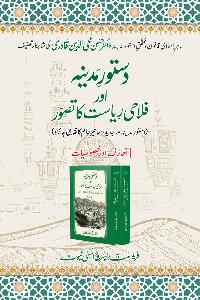Merits and Distinctions: The Constitution of Medina and the Concept of the Welfare State
The constitutional and administrative foundations of the State of Medina are based on the Constitution of Medina. This agreement was written between the Muslims of Medina and the leaders of other religions, the purpose of which was to achieve peace and mutual survival between groups of different colours, races and beliefs.
In this book, Dr Hassan Mohi-ud-Din Qadri has penned the details of the model of the State of Medina in detail. He has provided valuable information about the administrative, economic, judicial, legal and martial laws of the State of Medina, and the principles and regulations for human rights, freedom of expression and international relations and agreements with solid references.
Some of the important merits and distinctions of this book are as follows:
1. It has been proved with arguments that the Constitution of Medina is the first written constitution.
2. This is the first comprehensive and multifaceted analytical research on the Constitution of Medina.
3. For confirmation and attestation of the various articles of the Constitution of Medina, Quranic verses and Prophetic traditions are cited. Thus, by direct quotations and inference from the verses and hadiths, its authenticity and truthfulness has been proven with irrefutable proofs.
4. The book includes the commentaries of the scholars of the prestigious University of al-Azhar, on the confirmation and verification of the contents of the book.
5. This research book presents a comparative study of the Constitution of Medina with the American, British and European constitutions.
6. From the study of this book, it is realized that the State of Medina was the first welfare state in the history of the world.
7. In Britain, which claims to be the founder of modern democracy, an agreement called the Magna Carta came into existence in 1215 ce, while the drafting of the Constitution of Medina was done 593 years before this agreement in 622 ce.
8. The Magna Carta agreement was drafted unilaterally, while the representatives of many nations and religions agreed to the drafting of the Constitution of Medina.
9. Other ancient treaties were based on the foundations of making the individual power of a family, a tribe or a group permanent, while the Constitution of Medina took into account the interests of society with great foresight. The spirit of the Constitution of Medina was the protection of the lives, property and honour of the citizens. Without distinction of colour and race, the religious, political, economic and defence rights of every citizen of the State of Medina were protected. In short, the Constitution of Medina took into account the social interests, not the individual.
10. The foundation of the model of an Islamic, welfare and welfare state was laid in the light of the Constitution of Medina.
11. In this book, a brief history of constitution making in ancient civilizations including Greece and Rome has been highlighted. This is useful material for understanding the model of the State of Medina, from which it can be estimated that the administrative, economic and welfare model of the State of Medina is the best that has not been borrowed from any civilization of the past.
12. From the study of this book, one can also be aware of the features and objective conditions of Arab society. In it, the civilization of pre-Islamic times has been beautifully compared with the era of the Prophet ﷺ and a historic comparative review has been put before the reader in detail.
13. The study of this book also reveals the truth that ancient civilizations were destroyed due to large-scale migration caused by the oppression of rulers, and the refugees were also humiliated and disgraced. On the other hand, the State of Medina flourished due to the blessing of migration, and the people who migrated to the State of Medina were given respect, protection, and honour.
14. In contrast to the known ancient civilizations, which were dominated by autocracy, the State of Medina flourished under a council system. The spirit of this system was consultation and understanding.
Copyrights © 2024 Minhaj-ul-Quran International. All rights reserved




![The Constitution of Medina & The Concept of the Welfare State [Introduction and Salient Features]](https://minhajbooks.com/images-books/thumbnails200/The-Constitution-of-Medina-amp-The-Concept-of-the-Welfare-State-Introduction-and-Salient-Features-Dr-Hassan-Qadri_722.jpg)